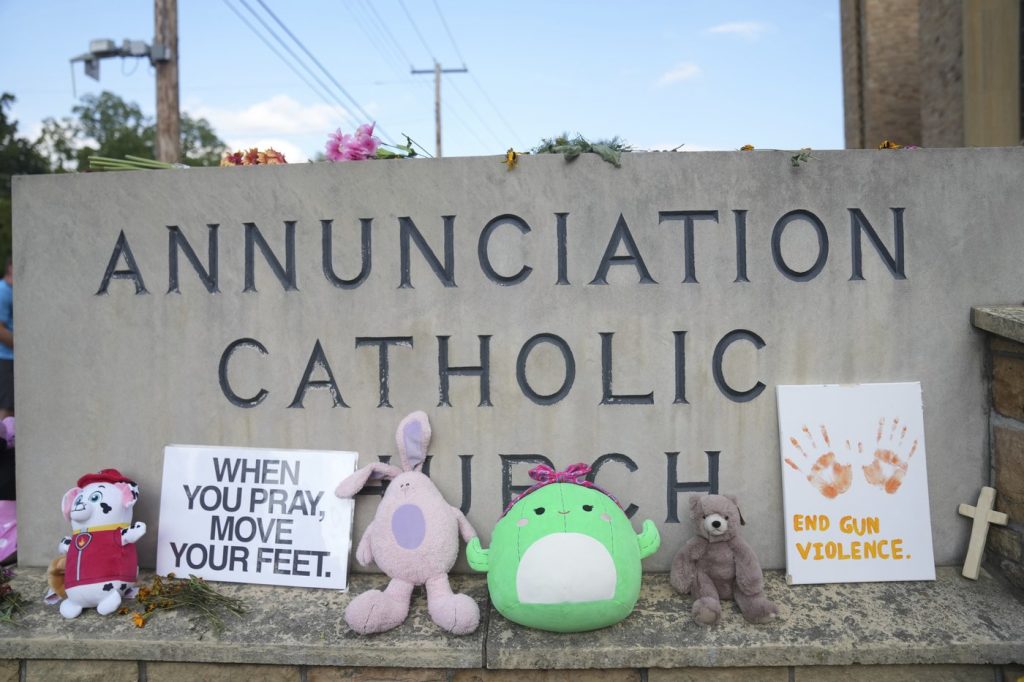MINNEAPOLIS (AP) — The recent shooting at a Catholic church in Minnesota, which was full of schoolchildren, has reignited discussions on the need for gun safety legislation in the state. The incident, which resulted in the deaths of two children and left 18 others injured, has highlighted the challenges of enacting policy changes in a state reflecting the national partisan divides surrounding gun control.
On Thursday, one day after the shooting at Annunciation Catholic Church in Minneapolis, Mayor Jacob Frey called for a ban on certain semiautomatic weapons and high-capacity magazines at both the state and federal levels. He emphasized that if state and national leaders do not take action, the city may pursue its own regulations. “I think we’d be happy to ban assault rifles here in Minneapolis,” Frey stated, expressing his determination to prevent future mass shootings.
The shooter, identified as 23-year-old Robin Westman, used a semiautomatic rifle during the attack, firing 116 rounds in under four minutes. Minnesota, while often associated with Democratic leadership, currently has a divided government, complicating the passage of any new legislation. Governor Tim Walz faces a state House equally divided between Democrats and Republicans, along with a Senate where Democrats hold only a slim majority.
Bipartisan cooperation is essential for passing any significant measures, including budgetary and gun safety reforms. Bryan Strawser, chair of the Minnesota Gun Owners Caucus, noted that there is a clear divide within the legislature on the issue of gun control. “We have one half of the Legislature that doesn’t believe that gun control is the answer to this,” Strawser remarked, indicating the challenges ahead for those advocating for stricter regulations.
Despite existing laws that regulate permits for semiautomatic rifles and handguns, these measures did not prevent Westman from legally acquiring firearms. Minnesota’s regulations include permit requirements and assessments by law enforcement to deny permits to those considered dangerous. Additionally, a new law allowing for extreme risk protection orders—commonly referred to as “red flag” laws—will take effect in 2024, aimed at temporarily removing guns from individuals deemed a threat.
Nick Suplina, senior vice president for law and policy at Everytown for Gun Safety, criticized the failure of existing laws to prevent the tragedy. “The failure to act here is the reason we are once again mourning dozens killed and injured in a school and a house of worship,” he stated, calling for regulations on assault weapons.
Looking ahead, Senate Judiciary Committee Chair Ron Latz plans to introduce a comprehensive list of gun safety proposals in 2026, including bans on assault rifles and high-capacity magazines. However, the prospects remain uncertain as Democratic Senate Majority Leader Erin Murphy expressed caution about the likelihood of passing new restrictions. She acknowledged the public's support for such measures, indicating a need for legislators to prioritize safety for children and communities.
Reflecting on past opportunities, House Democratic Floor Leader Jamie Long expressed regret over missed chances to pursue gun safety legislation when Democrats had full control in 2024. He recognized that it shouldn’t take a tragedy to prompt action and emphasized the readiness to make changes now.
Among those advocating for stricter gun control is the family of former House Democratic leader Melissa Hortman, who, along with her husband, fell victim to gun violence in June. They expressed a desire for immediate action to ensure safety for children in schools and communities. “We hope this tragedy spurs elected officials to take action toward common-sense measures on access to high-powered weapons,” they stated.
In the broader context, while a federal ban on certain semiautomatic firearms and large-capacity magazines expired in 2004, some states have imposed their own restrictions. Eleven states and Washington, D.C., currently have laws prohibiting high-powered firearms. However, even in states with Democratic leadership, such as Colorado, attempts to pass a ban on certain semiautomatic weapons have faced challenges.
The U.S. Supreme Court's recent decision not to hear a challenge to Maryland's semiautomatic weapons ban has also left the legal landscape uncertain, as advocacy groups continue to push back against such regulations. The Firearms Policy Coalition, a gun-rights organization, has sought legal recourse in various jurisdictions, including Cook County, Illinois, indicating ongoing tensions in the national debate over gun control.












